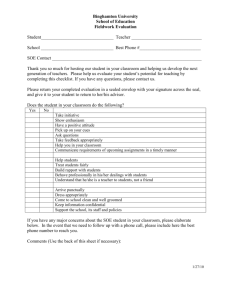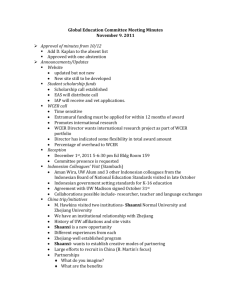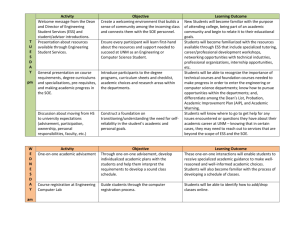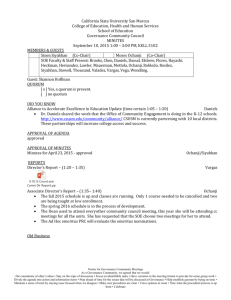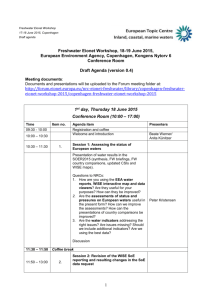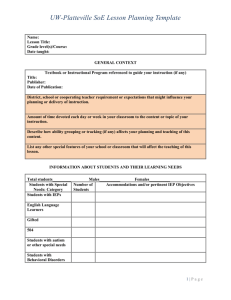OECD International Benchmarking Seminar
advertisement
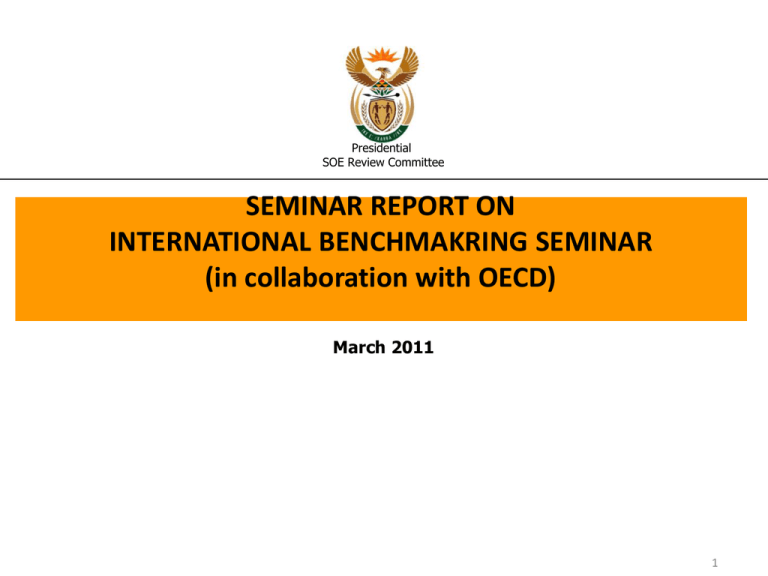
Presidential SOE Review Committee SEMINAR REPORT ON INTERNATIONAL BENCHMAKRING SEMINAR (in collaboration with OECD) March 2011 1 OUTLINE Introduction Objectives of the Seminar Summary of Attendees Summary points on the Seminar Working Paper Key Points from Presentations Summary of Input by Work Streams Summary of RDU Analysis Reflection: Were the Objectives achieved? Conclusion and Recommendations Presidential SOE Review Committee 2 Introduction Presidential SOE Review Committee The PRC, in collaboration with the OECD held a seminar on international benchmarking of SOE reforms The seminar was held in South Africa on 06-07 December 2010, at the CSIR International Convention Centre The seminar was addressed by Minister Malusi Gigaba, as the key note speaker An international delegation of representatives from UK, Malaysia, Finland, Namibia, and China were sponsored and hosted by the OECD to attend and present at the seminar. NEPAD was also part of the OECD’s delegation The seminar was hosted as an open seminar, where a varied group of stakeholders representing Government, business, and relevant associations were invited 3 Seminar Objectives Presidential SOE Review Committee The objectives of the seminar were to: Provide an introduction on various international SOE Reform models and topics to the PRC Share the preliminary international reforms with the PRC’s group of stakeholders Provide a platform to share South Africa’s SOE landscape with the OECD and the international delegation to forge partnerships on further benchmarking to be undertaken by the PRC To identify key trends and models emerging from the countries invited, to assist the PRC in shaping its approach to benchmarking during its review Elicit input from stakeholders attending the seminar on areas that are of importance and concern to the stakeholders The seminar was planned under the following themes: − SOE Reforms Undertaken and Challenges and Successes Experienced; − Governance and Ownership Models; − Value Creation and Effective Performance Monitoring of SOEs; and − Aligning the Strategic Role of SOEs with the State’s Development Objectives. 4 Summary of Attendees Presidential SOE Review Committee The PRC invited approximately 140 attendees to the seminar. The attendees consisted of: – Parliamentary portfolio committees – National departments – Provincial departments – Metropolitan municipalities – Business formations such as BUSA – Nedlac – The B-BBEE Advisory Council Of the 140 invitations, the seminar was attended by approximately 80 individuals (c.57% of the total invited) Representatives of national departments and metros were also invited to present, and/or contribute on the discussants panels of the seminar. The seminar programme is attached as Annexure A of this report. 5 Summary on Working Paper Presidential SOE Review Committee In preparation for the seminar, the OECD produced a working paper on SOE reforms. This working paper pointed out various themes on SOE reforms, with a summary on the experiences of various countries, such as UK, Malaysia, Finland, and Namibia. This paper is attached as Annexure B- Seminar Working Paper. In brief the paper highlighted the following: –In many countries, SOEs still represent a substantial part of GDP, employment and market capitalisation. Moreover, SOEs are often prevalent in utilities and infrastructure industries, such as energy, transport and telecommunication, whose performance is of great importance to broad segments of the population and to other parts of the business sector. Consequently, the governance of SOEs is still critical to ensure their positive contribution to a country’s overall economic efficiency and competitiveness, and the well‐being of its citizens. –The design and sequencing of reform implementation vary significantly as each country has adopted a formula according to its own conditions, organizational culture, political and administrative systems. In many countries, special committees or commissions were initially established in order to launch a debate centered around SOE governance and the design of necessary measures for improvement. In Brazil, the Commission for Corporate Governance and Management of Federal Government shares (CGPAR) was established to serve as a locus to discuss and develop the theme of SOE governance reform by engaging the main stakeholders in the process. Similar organizations were formed in other countries like Hungary (National Asset Management Council) and Oman. –The achievements of reform programs, as reported by the questionnaire respondents, vary according to objectives. However, a common outcome has been a clear improvement in economic performance and quality of public services. Other achievements that were cited included the separation of the state’s ownership function from its regulatory functions in line with the OECD Guidelines in Finland, increased level of transparency on management practices in Mozambique through regular publications of reports and accounts; and a heightened emphasis on corporate social responsibility in Norway. 6 Summary on Working Paper …./2 Presidential SOE Review Committee On Governance models: The 2005 Survey of OECD Countries defines three main types of ownership models: the decentralised or sector model, the dual model and the centralised model. The most traditional is the decentralised model where state‐owned enterprises are under the responsibility of relevant sector ministries. In the dual model, the responsibility is shared between the sector ministry and a “central” Ministry or entity, usually the Finance Ministry or the Treasury. Finally, a centralised model consolidates ownership responsibility for all or most SOEs under one main ministry or an agency. In most cases this is the Ministry of Finance (Denmark, the Netherlands, Spain) or the Ministry of Industry (Norway and Sweden). Belgium has a specific ministry, the Ministry of State‐Owned Enterprises and Participations. In a few cases, a specific Agency has been established, and this Agency is more or less autonomous, usually reporting once again to the Ministry of Finance (as in the case of France) On development imperatives and performance measurement: In order to create more value for their SOE sectors, a considerable number of countries have developed or revised their SOE governance policies, whether through legislation, government approval of specific documents addressing specific areas, or the approval of codes of conduct for SOEs. Some countries have launched extensive transformation programmes for their SOE sectors (e.g. Malaysia) while others have targeted specific measures such as guidelines on remuneration and employment of SOE directors (e.g. Finland, Norway and Sweden have all issued guidelines for the remuneration and employment conditions of SOE managers.). Many countries such as Egypt, India, Mozambique, Namibia, Oman, Pakistan, and Portugal have put emphasis on formulating SOE codes and guidelines as part of their efforts for improving the performance of their SOE sectors. While the OECD’s SOE Guidelines and other work on SOEs has not specifically addressed developmental objectives per se, it is clear that a number of countries with which the OECD works actively, such as China and Malaysia, have considered SOEs to be an important pillar in their overall developmental strategies. 7 Key Points from Presentations Presidential SOE Review Committee Opening address by Minister Gigaba: [SOEs] exist because the democratic South Africa has ever since its advent placed economic growth and development squarely on its policy agenda, in order to address the urgent challenge of poverty, inequality and massive joblessness. A key challenge in the South African economy is to accelerate the industrialisation process and decrease our reliance on resource exports. This involves developing intermediate and advanced manufacturing capabilities. SOEs have a role to play in this process, both through procuring in a manner that promotes industrial investment and through making direct targeted investments in these capabilities. Minister mentioned that SOEs in DPE will be required to comply with the current governance framework, namely the strategic intent statements, the shareholder compacts and the corporate plans. The contents of these documents will mirrors the performance agreement between the Minister and the President and the delivery agreement of the economic cluster. Opening Remarks, Richard Boucher (Deputy SG, OECD) This Committee can be an important catalyst to improve the effectiveness of South Africa’s SOEs and their contribution to South Africa’s economy. The OECD Guidelines provides recommendations on managing varied challenges, such as managing interests of different constituencies by SOEs. The OECD Guidelines call for establishing a neutral ownership entity with the overall responsibility for the government’s ownership policy, and the separation of the role of the state as owner from its role as regulator. 8 Key Points from Presentations …./2 Presidential SOE Review Committee Summary on Prof Eberhard: Important to prioritise those SOEs that have the biggest economic and developmental impact SOE reforms date back to 1960s when public ownership was emphasised, and later followed by a privatisation era Clarity on the roles of government as policy maker, regulator and shareholder Improve transparency and information on performance of SOEs Changing the political economy of SOEs such as reforming towards mixed-capital enterprises, and emphasising performance measurement and monitoring. SASAC China: SOE reforms in China date back to 1980. Between 1998-2002, China underwent a reform on its SOE ownership model, resulting in a SOE Group with subsidiaries of the Group listed. Small and medium sized SOEs were also listed and/or privatized. In 2009, China introducted a centralised ownership system, which provides oversight to 126 SOEs in 32 sectors. SASAC operates at national and local level. Model on appointment of boards and senior management. SASAC appoints certain senior management directly, and is responsible for all board appointments. The centralised model has allowed for SOEs to be insulated from certain political dynamics 9 Key Points from Presentations …/3 Presidential SOE Review Committee Finland SOEs overseen by an Ownership steering committee in the Office of the Prime Minister. SOE classification based on whether the SOE operates under market terms or has a special task assigned to it by Government Separation of ownership and regulation is of important consideration to Finland. The Mnistry of Trade and Industry is resposnible for various sector policies, and other Ministries responsible for regulation. Finland cites its accomplishments to include separation of regulation from ownership, and having one point from which state policy is implemented. Over and above the Companies Act, Finland has an Act on State Ownership Namibia The legal framework governing SOEs in Namibia include the State-Owned Enterprises Governance Act, The SOE establishing Acts in terms of which various SOEs were established, and New Companies Act, 2004 which has a bearing on the operataion of State Owned Companies, particulary in terms of the general principles of governance and the rights and obligations of shareholders. In the event of conflict the SOE Act overrides other Acts SOEG Council is a statutory body with the mandate and responsibility to provide oversight in respect of all SOEs in Namibia. The Council comprises of the the Prime Minister-Chairperson, Minister of Finance, Minister of Trade & Industry, Attorney-General, and Director of Natinal Planning Commission The SOEG Council is supervised by Cabinet and performs functions assigned to it by the Act. Challenges with implementation of the Act (since 2006) also outlined. 10 Key Points from Presentations …/4 Presidential SOE Review Committee NEPAD APRM: Key Reforms that have been made by African countries include – Enactment of legislation on the Governance of SOEs, Development of codes of conduct for SOEs – New Rules for Board Selection, Clearer accounting and transparency requirements, Introduction of performance contracts for SOEs and their managers, and Rethinking and reorganising the state ownership function such as embarked on by South Africa. Managing competing objectives inherent in state ownership Experience shows that capacity of oversight or coordination bodies in Africa is usually weak National Treasury. Key Questions posed to the Seminar: What role have SOEs played in other countries to promote growth and development? What regulatory frameworks are used to ensure that SOEs’ activities are aligned to government’s objectives? How do other governance models ensure a balance between the developmental objectives of the SOE and financial viability? What mechanisms are used to promote coordination between the government departments; spheres of government and SOEs? How is the developmental, operational and financial performance of SOEs assessed? To what extent can international models for the regulation and governance of SOEs be applied to enhance the South African model? 11 Were Seminar Objectives achieved? Limited information was provided on models of value creation and operational efficiency Limited information on quantitative indicators of SOEs role in development and transformation Models and challenges in implementation on Governance and Ownership were highlighted Legislative aspects were also provided The success of the seminar was in: – Presidential SOE Review Committee Fostering a stronger collaboration with the OECD, which paves the way for the PRC to collaborate with the OECD further in conducting benchmarking – The information provided was sufficient, at a high level, to provide the PRC with indicative models that can be researched further in designing the benchmark approach and sample, and allowing the PRC an opportunity to directly engage the countries – The seminar also allowed the PRC to share the review perspectives, and international models, with a wide group of stakeholders, which served provided useful communication and engagement between the PRC and its stakeholders Recommendations – To enable the PRC to undertake the benchmarking exercises, it is recommended that further research on other countries is undertaken to enable the Committee to finally select the basket of countries for benchmarking, and to design the benchmarking approach. – Recommended that this exercise is undertaken in partnership with HSRC given the preliminary research they are undertaking on this aspect of the review. 12 Presidential SOE Review Committee ANNEXURES: Work Stream Inputs & RDU Analysis 13 Presidential SOE Review Committee ANNEXURES: RDU Analysis (see separate attachment) 14 Presidential SOE Review Committee ANNEXURES: Work Stream Inputs: G&O Work Stream 15 Seminar Content: Overview Presidential SOE Review Committee Namibia: SoEs classified into three tiers State Owned Enterprises Governance Act 2006, Act 2006, Act no 2 of 2000 as amended by the State Owned Enterprises Governance Amendment Act no 5 of 2008 Aim: Covers the application and implication of the act in relation to the functions, roles and responsibility of the State Owned Enterprises Governance Council and the portfolio or shareholding minister SOE governance council( 6 Ministers) which as I’ve said is chaired by the prime minister and how the line ministry has power to appoint the board of directors, but at the same time is being assessed by the governance council The line minister vis a vis a portfolio minister. In some instances it is used interchangeably, but in the SOE Governance Act is defined what a portfolio minister is and what a line minister is. But in also some companies where you are supposed to have a line minister like for instance, our airline, Air Namibia, it is supposed to be under a line minister with is the ministry of works and transport, but because of the huge debt and assistance it gets from government its put un the ministry of finance. 16 Seminar Content: Overview Presidential SOE Review Committee UK: Strong on selling “South Africa is different because you have developmental objectives. So we don’t have the assets if we want to develop something in the economy. We don’t have the assets to do it, we have small assets, the biggest asset is probably ..(unclear) Mail, after that all the other businesses are quite small, so if there was something along the lines of job creation or some other sort of developmental social side of things, it will be quite difficult to do using SOE’s in the UK” Malaysia: “Books” SOE’s are called Government Linked Companies GLIC: Government Linked Investment Companies which is the holding company Protégé Committee: Headed by the prime minister. So the PCG made up of about four ministers and plus ten other private sector people: reviews the performance of GLC’s, the G20 every year. Every year all these companies will have to present their KPI’s, why they have not met their KPI’s, if not why. Normally they are given about three or four KPI’s 17 Seminar Content: Overview Presidential SOE Review Committee UCT: Prof Eberhard Survey of state owned enterprises across 23 African countries in all the major infrastructure sectors, electricity, telecoms, water, transport: a very clear pattern emerged that where there was direct political ongoing intervention in the SOE’s, as opposed to an arms length corporatisation shareholder kind of agreement Give specific weight to those which have the most developmental impact Some kind of centralised ministry which looks after the state owned enterprises separate to the policy ministry. 18 Seminar Outcomes Presidential SOE Review Committee From G&O perspective: Ownership/ Shareholding Models Oversight Governance Issues: Legislative Frameworks: Very Limited Relationship and Collaboration between Ministries: very Limited Board Remuneration Issues: Very Limited 19 Way Forward Presidential SOE Review Committee More benchmark work on: SoE legislative frameworks Collaboration between Ministries Remuneration Issues Care should be taken not to encumber SoEs more than they are currently. 20 Presidential SOE Review Committee ANNEXURES: Work Stream Inputs BC Work Stream 21 Agenda Key observations Potential gaps Presidential SOE Review Committee 22 Key Observations Presidential SOE Review Committee SOEs play a key role in any country that calls itself a Developmental State. National agenda, long-term vision and political will is key. In the case of SA it has not been clearly articulated and communicated i.e. if it exists. The alignment of the SOE mandate to that of a shareholder is crucial. Need to separate policy from oversight role. 23 Key Observations…/2 Presidential SOE Review Committee It is imperative to balance commercial and non-commercial imperatives. SA needs to identify specific areas where the intervention is needed. Collaborative opportunities, where SOEs collaborate with each other was highlighted. The performance evaluation and monitoring of SOEs should be viewed as a long-term project. Maintaining financial discipline is critical, more especially, where mandates are not clear. SOEs should be allowed to divest from sectors/investments that are no longer strategic. Strategic partnership with the private sector is crucial. 24 Key Observations…/3 Presidential SOE Review Committee There is a need to assess SA ‘s SOE model (current) and seek to identify the root cause of the problem. Could this be a legacy challenge or agency problem etc? The training and development of SOE executives and directors was a common thread in all case studies. 25 Potential Gaps Presidential SOE Review Committee How does one begin to evaluate the effectiveness of SA’s SOE model in the absence of a long term strategy/ vision? Benchmarking of SA’s SOE model in relation to developed and developing countries. The performance measurement tool and metrics used to evaluate SOE performance, specifically, non-commercial SOEs was not addressed. The relationship between and among SOEs operating in different spheres (i.e. National, Provincial and Local) of government did not receive the attention that it deserved. Regional economic integration How does service delivery at Municipal level link up with National/Provincial Agenda? How does we address the proliferation of SOEs? 26
